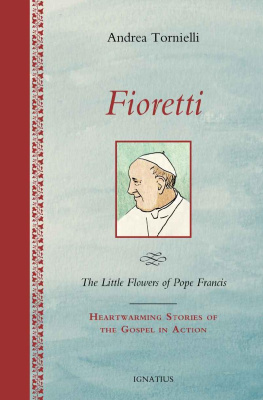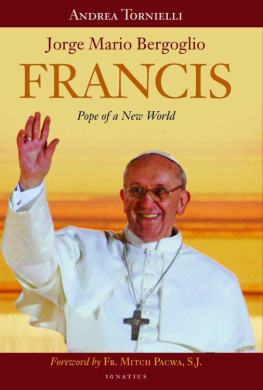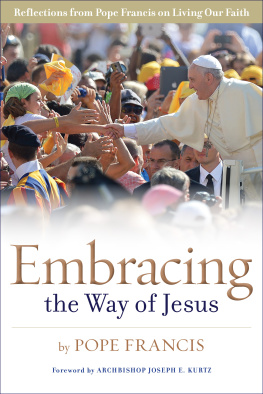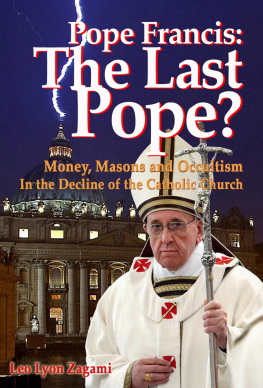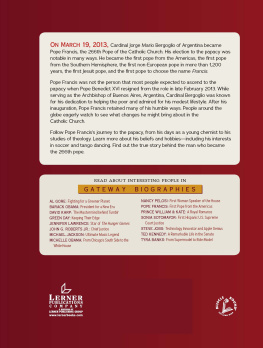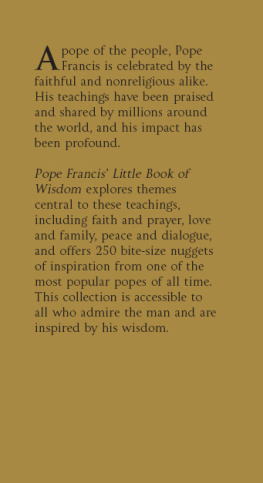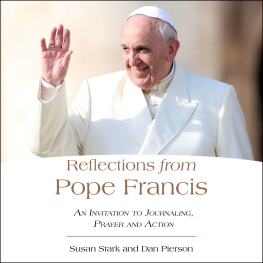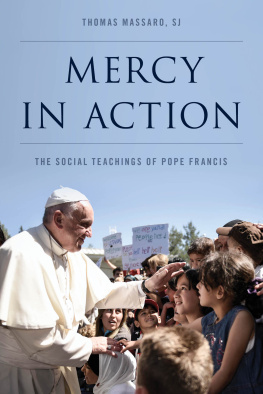Fioretti:
The Little Flowers
of Pope Francis
ANDREA TORNIELLI
Fioretti:
The Little Flowers
of Pope Francis

Heartwarming Stories
of the Gospel in Action
IGNATIUS PRESS SAN FRANCISCO
Original Italian edition:
I fioretti di Papa Francesco
2013 Edizioni Piemme Spa, Milan
www.edizpiemme.it
Unless otherwise indicated, citations from papal documents, homilies, and interviews are largely taken from the Vatican website or www.news.va
Cover design by John Herreid
2014 by Ignatius Press, San Francisco
All rights reserved
ISBN 978-1-58617-931-1
Library of Congress Control Number 2013922732
Printed in the United States of America
In memory of Nora and Nando,
who are watching us from above
Contents
Little Flowers of Mercy
Little Flowers of Frugality
Little Flowers of Everyday Holiness
Little Flowers on the Telephone
Marian Little Flowers
Little Flowers with a Smile
Little Flowers of Courage
Little Flowers of Sharing
Introduction:
The Fragrance of the Gospel
Since the evening of March 13, 2013, when the conclave elected a Pope who had come from the end of the earth, the gestures, words, and witness of Francis have impressed and continue to move a great many people in the world.
It is worthwhile returning for a moment to the memory of that March evening, when the new Pope, appearing on the central balcony of St. Peters, had the whole square pray, reciting the Our Father, Hail Mary, and Glory be, and before blessing the men and women of his new diocese and of the entire world, asked the crowd, the people of God, to pray for him.
The election, which took place very rapidly, as had been the case with the election of his predecessor, was a surprise. Just as the announcement, one month before, of the resignation by Benedict XVI had been a surprise.
Two basic things stand out, which help to explain the attention and the sympathy prompted by Francis, even in distant circles. This sympathetic attention gives no sign of diminishing, despite predictions about the end of the media honeymoon that have been made by those who seem sometimes to regret the recent experiences of the Church under attack.
The first is his personal witness to the Gospel message: little gestures and big ones, the minor or major choices that he has made each day, his ability to meet everyone and to speak to everyone, his simple way of being himself, have made him not only credible but above all close. The Pope is perceived by many, many people throughout the world as one of us. It is enough to watch him embrace the sick, the suffering, children. It is enough to see how much time he spends among the people before and after his Wednesday audiences, to notice this closeness of the Bishop of Rome who is not afraid of tenderness. We must not be afraid of tenderness! he repeated from the first acts of his new ministry as Bishop of Rome. Moreover the changes that he has brought about are there for everyone to see, in keeping with the unprecedented name that the Jesuit Pope chose to take: the name of the Poverello , the Little Poor Man of Assisi.
The second thing is the magisterium consisting of the homilies at the Mass that he celebrates each day in the Domus Sanctae Marthae. Short commentaries on the readings of the day, an encounter that is expected every morning. A bit-by-bit catechesis ( Catechetica in briciole was the title of a book by Albino Luciani [Pope John Paul I], who cared very much about the simplicity of preaching) which is at the same time profound and capable of touching the hearts of individuals. Day after day, this magisterium is guiding many believers, many more than major encyclicals or important cultural debates could ever reach.
The message that Francis considers most important, as he himself said in his homily at the Mass in the Vatican parish of St. Anna on March 17, is the message of mercy. Without mercy, he said to the Brazilian bishops during his journey to Rio de Janeiro, we have little chance nowadays of becoming part of a world of wounded persons in need of understanding, forgiveness, love. He added, We need a church able to make sense of the night contained in the flight of so many of our brothers and sisters.... We need a church unafraid of going forth into their night... a church capable of meeting them on their way.
I dream of a church that is a mother and shepherdess, Francis said during his interview with the editor of La Civilt Cattolica , Antonio Spadaro [which was published in English by America ]. The churchs ministers must be merciful, take responsibility for the people and accompany them like the good Samaritan, who washes, cleans, and raises up his neighbor. This is pure Gospel. God is greater than sin.
The Pope added:
The structural and organizational reforms are secondarythat is, they come afterward. The first reform must be the attitude. The ministers of the Gospel must be people who can warm the hearts of the people, who walk through the dark night with them, who know how to dialogue and to descend themselves into their peoples night, into the darkness, but without getting lost. The people of God want pastors, not clergy acting like bureaucrats or government officials. The bishops, particularly, must be able to support the movements of God among their people with patience, so that no one is left behind. But they must also be able to accompany the flock that has a flair for finding new paths.
Instead of being just a church that welcomes and receives by keeping the doors open, let us try also to be a church that finds new roads, that is able to step outside itself and go to those who do not attend Mass, to those who have quit or are indifferent. The ones who quit sometimes do it for reasons that, if properly understood and assessed, can lead to a return. But that takes audacity and courage.
One fact that is obvious to anyone who is trying to look at realityand does not allow himself to be affected by nostalgic prejudices, by his own tastes in ecclesiastical attire, or else by the self-referential debate of some intellectual circles that often flattened the profound Magisterium of Pope Benedict XVI into the dimensions of an exclusively law-and-order Churchis that the pontificate of Francis has given many people a second wind.
Francis attitude of humility and closeness, this return to the essentials of the Christian faith and to the radical character of the Gospel, is the distinctive sign of this initial period. A closeness capable of warming hearts, which was manifested in full force on the occasion of his first journey outside of Rome, in July 2013, when the Pope traveled to Lampedusa to visit the immigrants who land there on the old, unsafe boats that too often turn into coffins sunk in the depths of the sea.
A closeness that emerged during the journey to Brazil, which culminated with a visit of the Pontiff to a favela [slum].
If we step outside ourselves, Francis said during the Vigil of Pentecost with the ecclesial movements, we find poverty.
Todayit sickens the heart to say sothe discovery of a tramp who has died of the cold is not news.... Today, the thought that a great many children do not have food to eat is not news. This is serious, this is serious! We cannot put up with this!... We cannot become starched Christians, those over-educated Christians who speak of theological matters as they calmly sip their tea. No! We must become courageous Christians and go in search of the people who are the very flesh of Christ!
This book contains incidents, excerpts from homilies, testimonies, encounters, telephone calls that have Pope Francis as their protagonist. The title echoes the Little Flowers of St. Francis , the famous collection of stories about the beloved Francis of Assisi, whose name the Pope adopted for himself. The present work makes no claim to completeness, nor does it intend to offer a systematic account of the first months of Francis pontificate or to present analyses and commentaries. It merely tries to offer a collection of fragments, a little selection which, page after page, may help the reader to become better acquainted with the Bishop of Rome who came from the end of the earth.
Next page
